Babies have a reputation for having flawless skin, so most new parents are surprised to learn that baby-soft skin is a bit of a myth. Skin blemishes are quite common during the first year of life. Caring for your baby's delicate skin is essential for their overall health and well-being. Here's a complete guide to baby skincare routine:
-
Bathing: Lukewarm water is recommended to wash your baby every 2-3 days. Use a mild baby soap or cleanser to avoid drying out their skin. Don't use hot water and avoid using adult soaps and shampoos on your baby.
-
Diapering: Change your baby's diaper frequently to prevent diaper rash. Clean their bottom with water or a mild baby wipe and apply a diaper rash cream or ointment to prevent irritation.
-
Moisturizing: Moisturizing your baby's skin regularly is important to keep it soft and hydrated. Use a mild, fragrance-free baby lotion or cream to avoid any irritation.
-
Clothing: Dress your baby in loose-fitting, comfortable clothing made from soft, breathable fabrics like cotton. Avoid clothes with rough seams or tags that can irritate their delicate skin.
-
Sun Protection: Babies under 6 months old should be kept out of direct sunlight. When you take your baby outside, dress them in lightweight, protective clothing and use a broad-spectrum, water-resistant sunscreen with an SPF of at least 30.
-
Massage: Massaging your baby's skin with gentle, circular motions can help improve circulation and promote relaxation. Use a mild, fragrance-free baby oil or lotion to make the massage more comfortable.
-
Laundry: Wash your baby's clothes, blankets, and towels with a mild, fragrance-free detergent to avoid any irritation or allergic reactions.
-
Avoid Harsh Chemicals: Avoid using products with harsh chemicals, fragrances, or dyes on your baby's skin. These can cause irritation and dryness.
-
Watch for Signs of Irritation: Keep an eye out for any signs of irritation, such as redness, rashes, or dry patches. If you notice any of these, consult with your paediatrician for advice.
-
Be Gentle: Always be gentle when caring for your baby's delicate skin. Avoid scrubbing, rubbing, or using excessive force when bathing, moisturizing, or massaging them.
By following these simple steps, you can help keep your baby's delicate skin soft, healthy, and free from irritation.
7 Essential Steps for a Gentle and Effective Baby Skin Care Routine
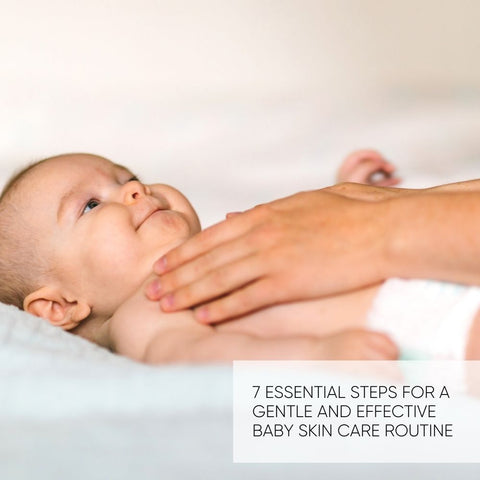
Babies, particularly new-born, are still adjusting to their harsh surroundings. As a result, their skin is extra sensitive and reacts quickly to even the slightest discomfort. For example, irritants such as soap, shampoo, and diapers can cause a rash or breakout. As a result, their skin requires special attention.
However, please keep in mind that every baby's skin is unique, and you should consult with your paediatrician if you have any concerns about your baby's skin. Here are seven essential steps for a gentle and effective baby skincare routine:
-
Use gentle, fragrance-free products: Choose mild, fragrance-free products that are specifically designed for babies’ delicate skin. Look for products that are labelled "hypoallergenic" and "non-comedogenic."
-
Bath your baby in lukewarm water: Fill a small baby bathtub or sink with lukewarm water (around 100 degrees Fahrenheit) and avoid hot water. Don't bathe your baby for too long or too frequently.
-
Be mindful of the soap: Use a gentle soap designed for babies and sparingly. Don't use any products that can dry out the baby's skin.
-
Gently pat your baby's skin dry: Avoid rubbing your baby's skin dry with a towel, which can be harsh on their delicate skin. Instead, use a soft towel and gently pat your baby's skin dry.
-
Apply moisturizer: Apply a mild, fragrance-free moisturizer after bathing to keep your baby's skin soft and hydrated.
-
Avoid fragrances and other irritants: Avoid using products with fragrances, dyes, or other potential irritants, such as alcohol or salicylic acid. These ingredients can be too harsh for your baby's skin.
-
Protect your baby's skin from the sun: Keep your baby out of direct sunlight, especially during peak hours. If you must take your baby outside, dress them in protective clothing and a hat, and use sunscreen specifically designed for babies with a minimum of SPF 30.
Remember to always be gentle with your baby's skin, and consult with a paediatrician if you have any concerns about your baby's skincare routine.
#1 Keep it Simple - A Gentle Cleansing Routine
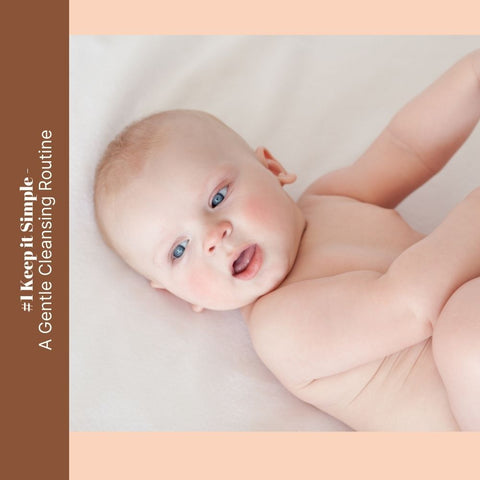
A simple cleansing routine can consist of just a few steps:
-
Start by washing your hands to avoid introducing any bacteria or dirt onto baby's face.
-
Wet baby's face with warm water.
-
Apply a gentle cleanser, such as a cream or foam, to baby's face and neck. Use your fingertips to massage the cleanser into baby's skin in a circular motion. Avoid using hot water, as it can strip baby's skin of its natural oils.
-
Rinse baby's face thoroughly with lukewarm water, using your hands or a soft cloth to remove all traces of cleanser.
-
Pat baby's skin dry with a clean, soft towel.
-
Follow up with a moisturizer to help lock in hydration and keep baby's skin soft and supple.
#2 Preventing Diaper Rash - The Importance of Regular Diaper Changes
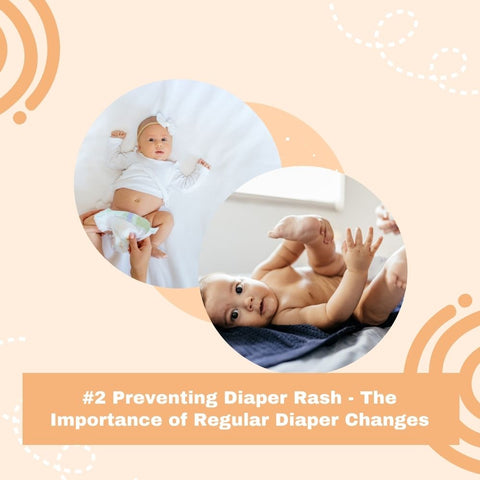
Diaper rash is a common skin irritation that affects many babies and young children. It can be caused by a variety of factors, including prolonged exposure to wet or dirty diapers, friction, and the use of certain chemicals or materials. One of the most important ways to prevent diaper rash is by ensuring that your child's diaper is changed regularly.
When a baby's diaper is wet or soiled, the moisture and bacteria in the diaper can irritate the skin and lead to a rash. To prevent this from happening, it is recommended that parents change their baby's diaper every two to three hours, or more often if the diaper is wet or soiled.
In addition to changing the diaper regularly, it's important to make sure that the diaper area is clean and dry before putting on a new diaper. This can be done by gently wiping the area with a soft, damp cloth or using a baby wipe, and then patting the skin dry with a clean towel.
Other tips for preventing diaper rash include using a diaper cream or ointment to protect the skin, avoiding tight-fitting diapers or clothing, and giving your baby some time without a diaper to allow the skin to breathe. If your baby does develop a diaper rash, there are many over-the-counter creams and ointments that can help to soothe and heal the skin.
In summary, regular diaper changes are essential to preventing diaper rash. By keeping the diaper area clean and dry, using protective creams or ointments, and giving your baby some time without a diaper, you can help to keep your child's skin healthy and free from irritation.
#3 Moisturize for Soft and Supple Skin
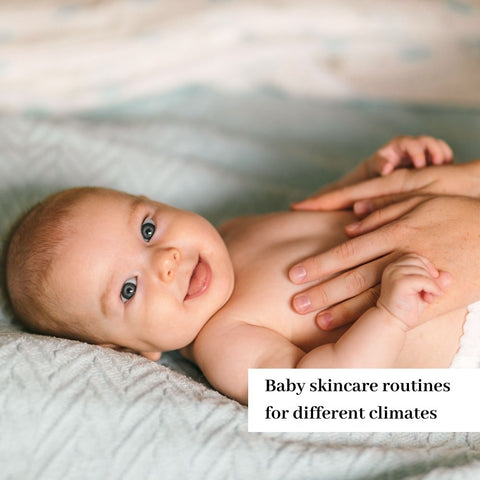
Moisturizing is essential in any skincare routine as it helps keep baby's skin soft, supple, and hydrated. Here are some tips for moisturizing your baby's skin effectively:
-
Choose the right moisturizer: The type of moisturizer you use will depend on baby's skin type. If baby has oily skin, choose a lightweight, oil-free moisturizer. If baby has dry skin, choose a heavier, cream-based moisturizer.
-
Apply moisturizer after cleansing: After cleansing baby's skin, pat it dry with a clean towel and apply moisturizer immediately. This helps to lock in moisture and keep baby's skin hydrated.
-
Use moisturizer regularly: To keep baby's skin soft and supple, it's important to use moisturizer regularly. Ideally, you should moisturize baby's skin twice a day - once in the morning and once at night.
-
Don't forget to moisturize baby's body: Baby's face isn't the only part of baby's body that needs moisturizing. Make sure to moisturize baby's hands, arms, legs, and feet regularly as well.
By following these tips and making moisturizing a regular part of your baby's skincare routine, you can help keep your baby's skin looking and feeling healthy and radiant.
Navigating Baby Skin Sensitivities and Common Issues
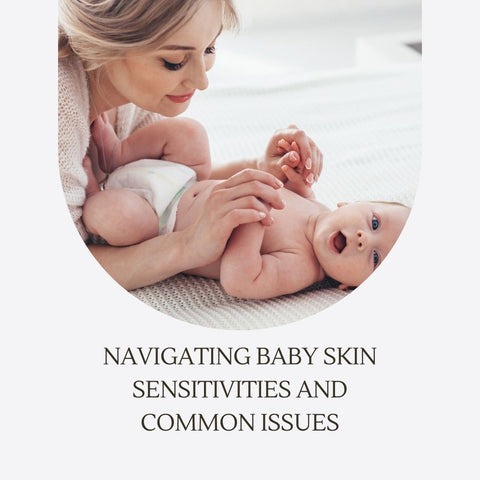
Navigating newborn skin sensitivities and common difficulties can be difficult for new parents, but with the right knowledge and care, you can manage them effectively. Here are some pointers: use mild products, keep it simple, look out for irritants, choose clothing intelligently, bathe with care, moisturise regularly, exercise caution with washing detergent, shield from the sun, check for indications of irritation, and see a specialist. By following these guidelines and paying attention to your baby's skin, you may help keep it healthy and pleasant, regardless of any allergies or frequent difficulties that occur.
#4 Shielding from the Sun - Safe Sun Protection for Babies
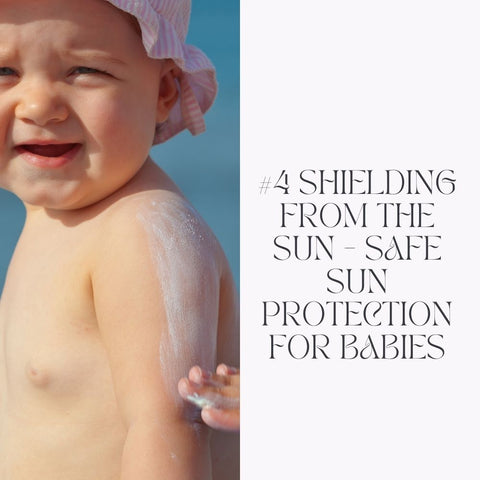
Babies have delicate skin that is more sensitive to the sun's harmful rays than adult skin. Sunburn in childhood can increase the risk of skin cancer later in life, so it is important to protect babies from the sun. Here are some safe sun protection tips for babies:
-
Keep babies out of direct sunlight: Infants should be kept out of direct sunlight, especially during peak hours between 10 a.m. and 4 p.m. If possible, try to plan outdoor activities for early morning or late afternoon.
-
Dress babies in protective clothing: Dress babies in lightweight, long-sleeved clothing and long pants to protect their skin from the sun. Choose clothes made from tightly woven fabric that provides good coverage. Hats with wide brims can protect their face, neck, and ears.
-
Use sunscreen with caution: Sunscreen can be used on babies six months or older, but it should be applied sparingly and with caution. Choose a sunscreen with an SPF of at least 30 and look for one that is labelled "broad spectrum" to protect against both UVA and UVB rays. Apply sunscreen 15 minutes before going outside and reapply every two hours or after swimming or sweating.
-
Stay in the shade: Seek out shaded areas such as under trees, umbrellas, or covered strollers. Shade can reduce UV exposure by up to 60%.
-
Use sunglasses: Protect your baby's eyes with sunglasses that have 100% UV protection. Look for glasses that wrap around their face and have an elastic strap to keep them in place.
-
Be aware of reflections: Water, sand, and snow can reflect sunlight and increase UV exposure. Be mindful of this and take extra precautions when near these reflective surfaces.
Remember, the best way to protect your baby from the sun is to limit their exposure and cover up with protective clothing. If you are unsure about how to safely protect your baby from the sun, consult your paediatrician.
#5 Choosing Safe and Effective Baby Skin Care Products
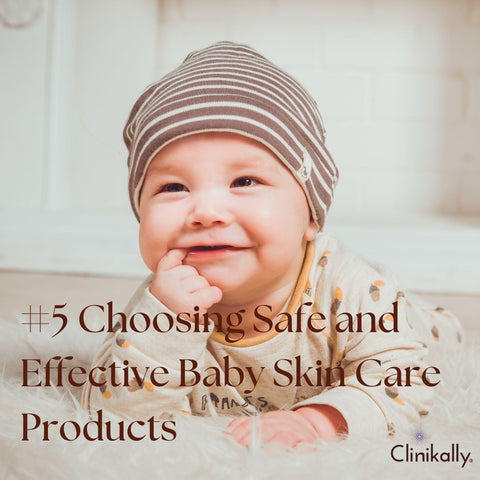
Choosing safe and effective baby skin care products is important to keep your baby's skin healthy and protected. Here are some tips to help you select the right products for your baby:
-
Look for products specifically designed for babies: Baby skin is delicate and sensitive, so it's important to use products that are specifically formulated for babies. Avoid using adult skin care products on your baby's skin as they may contain harsh chemicals that can cause irritation and dryness.
-
Read the ingredients list: Look for products that have a short and simple ingredients list, with ingredients that are gentle and safe for baby's skin. Avoid products that contain harsh chemicals like parabens, sulfates, phthalates, and synthetic fragrances.
-
Avoid products with allergens: If your baby has a history of allergies or eczema, avoid products that contain common allergens like milk, soy, wheat, and nuts.
-
Choose fragrance-free products: Fragrances can cause skin irritation and are often unnecessary in baby skin care products. Look for fragrance-free products or products that use natural fragrances like essential oils.
-
Check for certifications: Look for products that have been certified by reputable organizations like the National Eczema Association, the Skin Cancer Foundation, or the Environmental Working Group.
-
Patch test: Before using a new product on your baby, do a patch test on a small area of the skin to ensure that there is no allergic reaction or irritation.
-
Consult with your paediatrician: If you have any concerns or questions about which products to use on your baby's skin, consult with your paediatrician.
The following are some of the best baby skin care products:
-
Sebamed Baby Cream Extra Soft: Sebamed Baby Cream Extra Soft's rich natural lipid formula helps to maintain skin moisture and is clinically proven to be effective on babies with atopic or sensitive skin.
-
Cetaphil Baby Gentle Wash & Shampoo: Cetaphil Baby Gentle Wash & Shampoo is ideal for your baby's soft and sensitive skin. The tear-free formula gently cleanses and moisturises a baby's delicate skin and hair without drying, allowing moisture to be retained, and is gentle enough to use on a newborn. It's non-irritating, non-sensitizing, and PH-neutral, so it's ideal for a baby's sensitive skin. This dermatologist and the ophthalmologist-tested formula is hypoallergenic and allergy-tested, ensuring your child's safety.
-
Cetaphil Baby Daily Lotion: The Cetaphil Baby Daily Lotion moisturises and protects your baby's skin from dryness. This nourishing lotion contains natural emollients like sunflower seed oil, soybean oil, and a shea butter and glycerin blend that helps to soothe and nourish your baby's skin. Its non-greasy, lightweight formula is ideal for everyday use and is free of parabens, phthalates, and dyes.
-
Sebamed Baby Powder: Sebamed Baby Powder reduces the effect of rubbing and chafting. Absorbs excess moisture from baby's skin, making him or her feel more comfortable. The extra soft formula with allentown protects baby's sensitive skin from irritation.
Remember, every baby is different, and what works for one baby may not work for another. It's important to pay attention to your baby's skin and adjust your skincare routine as needed.
#6 Treating Common Skin Issues - Rash, Dryness, and Eczema
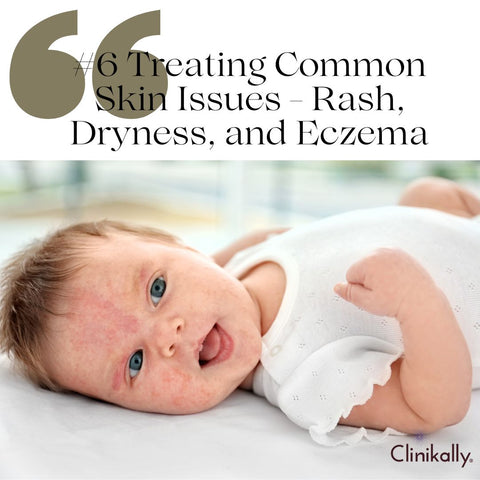
Skin issues such as rash, dryness, and eczema can be uncomfortable and even painful. Here are some tips for treating these common skin issues:
-
Rash: A rash can be caused by a variety of factors, including allergies, infection, and irritation. To treat a rash, first identify and remove the cause if possible. For example, if the rash is caused by an allergic reaction to a particular substance, avoid contact with that substance in the future. You can also apply over-the-counter creams or ointments containing hydrocortisone, which can reduce inflammation and itching.
-
Dryness: Dry skin is common, especially during the winter months. To treat dry skin, moisturize regularly with a fragrance-free, non-comedogenic lotion or cream. Avoid hot showers or baths, which can further dry out your skin. Instead, take lukewarm showers or baths and limit your time in the water.
-
Eczema: Eczema is a chronic skin condition characterized by red, itchy, and scaly patches. To treat eczema, moisturize regularly and avoid triggers such as stress, certain foods, and irritants like harsh soaps or detergents. Over-the-counter creams or ointments containing hydrocortisone or prescription medications may also be prescribed by a healthcare professional to help manage the symptoms of eczema.
In addition to these tips, it's important to maintain good skin hygiene and avoid scratching or rubbing affected areas, as this can further irritate the skin and worsen symptoms. If your skin issues persist or worsen despite these measures, it's important to consult with a healthcare professional for further evaluation and treatment.
Advanced Care and Protection for Baby's Skin
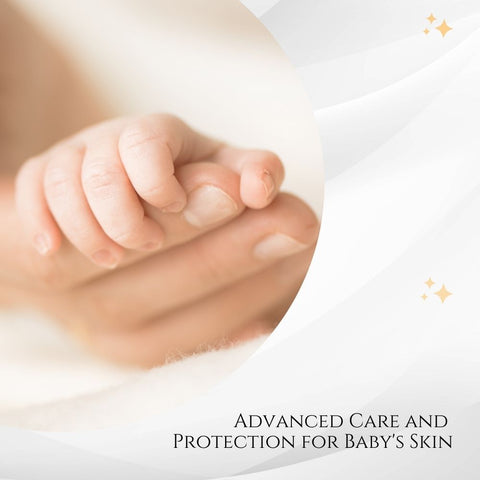
To ensure your baby's health and comfort, advanced skin care and protection require a combination of proactive and responsive actions. Here's a more detailed guide:
-
If you're breastfeeding, your diet can impact your baby's skin health. Eating a balanced diet rich in vitamins and nutrients can contribute to healthier skin for both you and your baby.
-
Ensure your baby stays well-hydrated, especially in hot or dry weather. Offer breast milk or formula frequently and consider using a humidifier in dry indoor environments to prevent skin dehydration.
-
Be mindful of bathing frequency and water temperature. Too much bathing or using hot water can strip the skin of its natural oils, leading to dryness and irritation. Stick to lukewarm water and limit baths to a few times per week, as needed.
-
Establish a gentle skincare routine for your baby, including cleansing, moisturizing, and diaper care. Use mild, fragrance-free products formulated for babies, and be consistent with your routine to maintain healthy skin.
-
Change your baby's diaper frequently to prevent diaper rash and irritation. Use gentle wipes or warm water and cotton balls for cleaning, and apply a diaper cream or ointment with each diaper change to protect against moisture and friction.
-
Shield your baby's skin from harsh weather conditions, including extreme temperatures, wind, and sun exposure. Dress them appropriately for the weather and use sun protection measures such as hats, clothing, and sunscreen when outdoors.
-
If you swaddle your baby, make sure it is done properly to avoid overheating and skin irritation. Choose lightweight, breathable fabrics and avoid tight wrapping that limits airflow or movement.
-
Pay attention to potential allergens in your baby's environment, such as pet dander, dust mites, and specific foods. Reduce exposure to known allergens and consult a doctor if you suspect allergies are affecting your baby's skin.
-
Keep an eye out for any changes in your baby's skin, such as rashes, redness, or abnormal bumps. Address any concerns as soon as possible by consulting with a paediatrician or dermatologist to ensure proper diagnosis and treatment.
-
Skin-to-skin contact with carers provides numerous benefits to babies, including improved skin health, temperature regulation, and bonding. Spending quality time cuddling and snuggling with your baby will promote healthy skin and overall well-being.
By incorporating these advanced care and protection measures into your baby's routine, you can help protect their delicate skin while also promoting optimal health and comfort from infancy and beyond.
#7 Taking Care of Your Little One's Skin from Head to Toe
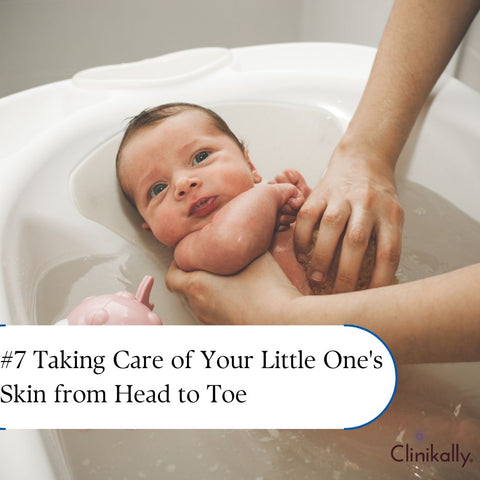
Taking care of your little one's skin is important, as their skin is delicate and requires special attention. Here are some tips on how to take care of your baby's skin from head to toe:
Head:-
Gently wash your baby's scalp with a mild shampoo to prevent cradle cap.
-
Avoid using hair products on your baby's hair, as they may cause irritation.
-
Use a soft-bristled brush to comb your baby's hair gently.
-
Wash your baby's face with a soft cloth and warm water.
-
Avoid using soap on their face as it may cause dryness.
-
Pat their face dry with a soft towel.
-
Give your baby a warm bath using mild soap and water.
-
Avoid using hot water as it can dry out your baby's skin.
-
Use a soft towel to dry your baby's skin, being careful not to rub too hard.
-
Apply a gentle moisturizer to your baby's skin to keep it hydrated.
-
Change your baby's diaper frequently to prevent diaper rash.
-
Clean your baby's diaper area with a gentle wipe or damp cloth.
-
Apply diaper cream or ointment to prevent irritation.
-
Keep your baby's feet clean and dry.
-
Use baby socks or booties to keep their feet warm.
-
Trim your baby's toenails regularly to prevent them from getting too long.
In general, it is essential to use gentle, fragrance-free, and hypoallergenic products on your baby's skin. If you notice any rashes, bumps, or other skin irritations, contact your paediatrician immediately.
Managing cradle cap and baby acne
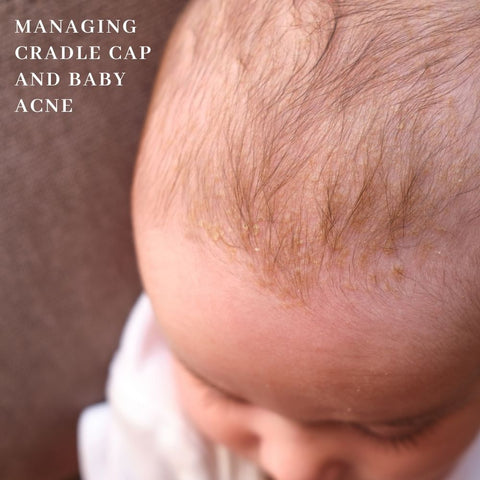
Managing cradle cap and baby acne requires gentleness and patience. Here's how you can approach each issue:
-
Cradle Cap treatments include gently massaging the scalp, using a mild shampoo, applying oil or petroleum jelly, brushing away scales, repeating as needed, and consulting a paediatrician.
-
Baby acne treatment includes keeping the skin clean, avoiding oily products, not squeezing or picking, patience, and consulting a paediatrician.
Seasonal baby skin care tips
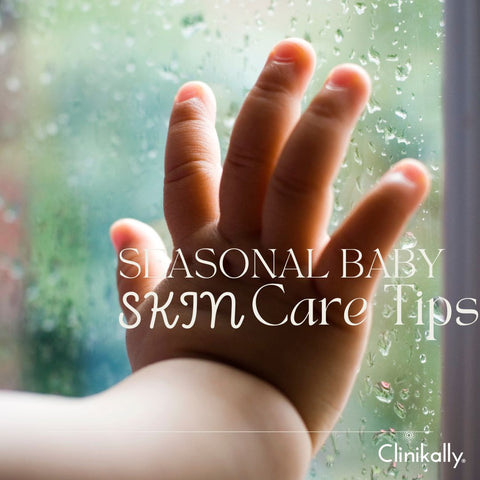
Seasonal changes can have an impact on your baby's skin, so make adjustments to your skincare routine as needed. Below are some seasonal baby skin care tips for different times of the year:
Spring:-
As the weather warms, make sure your baby is protected from the sun's damaging UV rays. Dress them in light, long-sleeved clothing with a wide-brimmed hat and sunglasses. Apply a broad-spectrum sunscreen with SPF 30 or higher to exposed skin and reapply as needed.
-
To avoid skin feeling too oily in warm weather, switch from heavier winter moisturisers to lighter, non-greasy formulas. Look for gentle moisturisers that are safe for your baby's sensitive skin.
-
Springtime allergens like pollen can exacerbate skin conditions such as eczema. Keep an eye out for any signs of allergy-related skin reactions and consult with your pediatrician if needed.
-
Hot weather can lead to dehydration, which can affect your baby's skin. Ensure they stay well-hydrated by offering breast milk, formula, or water frequently, especially if you're spending time outdoors.
-
Try to avoid being outdoors during the peak hours of the sun (usually between 10 a.m. and 4 p.m.). Seek shade whenever possible, and dress your baby in lightweight, breathable clothing that covers their skin.
-
Give your baby cool baths to help regulate their body temperature and soothe their skin. Avoid using hot water, as it can further dehydrate the skin.
-
As the weather cools, the air becomes drier, which causes dry skin. Increase the frequency with which you moisturise your baby's skin to keep it hydrated and free of dryness and irritation.
-
Dressing your baby for outdoor activities should take into account temperature fluctuations. Layering clothing helps them stay comfortable as the weather changes throughout the day.
-
Windy conditions can be harsh on your baby's sensitive skin. To protect against windburn, apply a barrier cream or petroleum jelly to any exposed areas, such as your face.
-
To protect your baby from the cold, dress him or her in warm, layered clothing. Make sure they wear a hat and mittens to keep their extremities warm.
-
Indoor heating can dry out the air, causing dry skin. Use a humidifier in your baby's room to add moisture to the air and keep the skin from becoming dry and irritated.
-
Limit your bath time to 5-10 minutes and use lukewarm water to prevent your skin from drying out. Following a bath, gently pat your baby's skin dry and immediately apply moisturiser to lock in moisture.
By following these seasonal baby skincare tips, you can help protect your baby's sensitive skin and keep it healthy and comfortable all year.
Empowering Parents: Beyond Basic Baby Skin Care
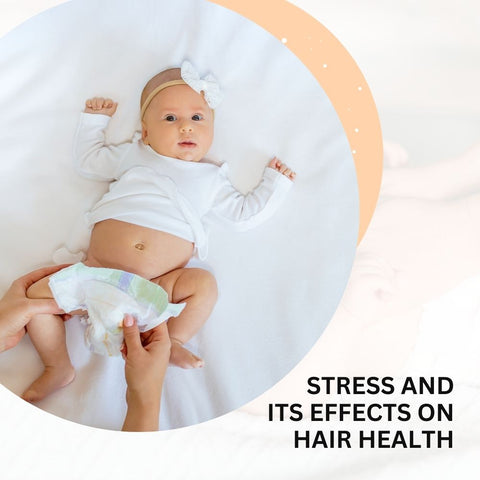
Empowering parents with knowledge beyond basic newborn skincare entails understanding more subtle aspects of skin health and addressing any concerns that may develop.Understanding skin conditions, customising skincare routines, emphasising prevention, encouraging skin-to-skin contact, nutritional considerations, managing allergies and sensitivities, seeking professional advice, and providing emotional support are some advanced tips to help parents care for their baby's skin. By providing parents with improved knowledge and resources, they can feel more secure and competent of caring for their baby's skin and dealing with any issues that may develop. Encourage continual education and open communication to help parents promote their baby's best skin health.
Tips for baby's bath time and hydration
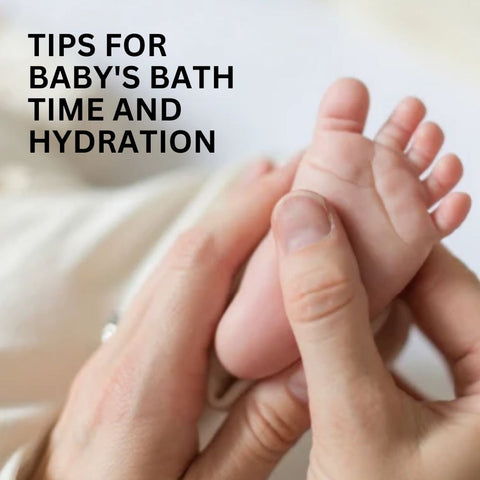
Bathing and hydration are essential components of baby care. Here are a few suggestions for each:
-
Bath time for babies includes frequency, water temperature, keeping it short, using a gentle cleanser, a soft cloth or sponge, shampooing, thoroughly rinsing, patting dry, and moisturising.
-
Hydration includes breastfeeding or formula, monitoring wet diapers, providing water, keeping an eye out for signs of dehydration, and avoiding overhydration.
By following these bath time and hydration tips, you can keep your baby clean, comfortable, and hydrated. Always follow your instincts as a parent and seek medical attention if you have any concerns about your baby's health or well-being.
Fabric choices for baby's sensitive skin
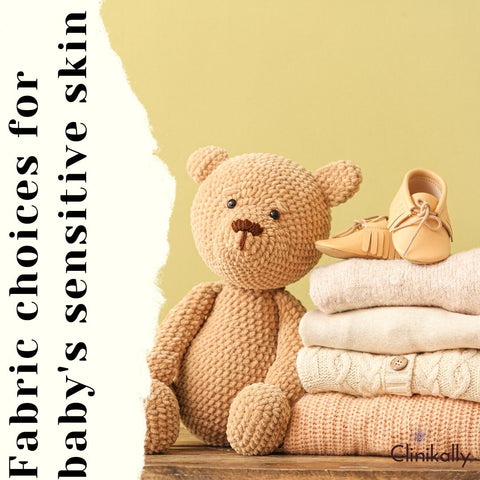
Choosing the proper textiles for your baby's sensitive skin will help reduce irritation and discomfort. Fabrics to consider include organic cotton, bamboo, silk, microfiber, merino wool, modal, and fannel. When selecting fabrics for your baby's delicate skin, prioritise softness, breathability, and hypoallergenic characteristics. Avoid textiles that are rough, scratchy, or treated with harsh chemicals since they can cause irritation and discomfort. Always wash new clothing and bedding before using it on your infant to remove any residual chemicals or allergens.
Baby skin care during travel

Keeping up with infant skincare when travelling involves some forethought and preparation. Pack essentials, choose travel-friendly products, protect from the sun, dress appropriately, remain hydrated, maintain hygiene, diaper care, be aware of allergens, bring comfort items, and stay flexible. By following these guidelines, you can help keep your baby's skin healthy and comfortable while travelling, allowing you to enjoy your trip with confidence.
Comprehensive Baby Care: From Head to Toe
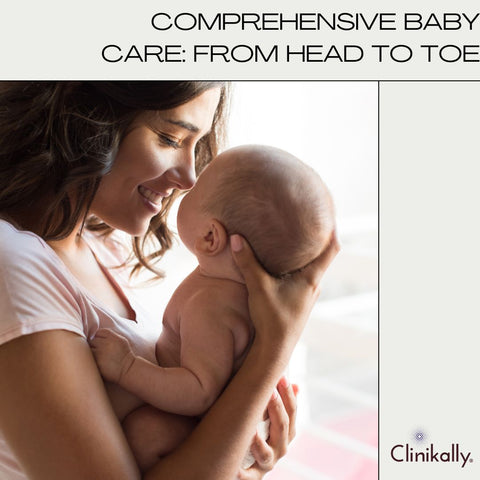
Comprehensive baby care encompasses all aspects of your child's well-being, from head to toe. Here's a breakdown of important care tips for each area.
-
Head: Gently massage your baby's scalp with baby oil before bath time to help loosen flakes. Use a soft brush to gently remove scales, and shampoo with a mild baby shampoo. Use a mild baby shampoo to wash your baby's hair, and gently comb out any tangles with a soft brush or comb. Avoid using adult hair care products, as they may be too harsh for your baby's delicate scalp.
-
Face: Use a soft washcloth or cotton pad dampened with warm water to gently clean your baby's face. Be especially careful around the eyes, nose, and mouth. Apply a gentle baby moisturizer to your baby's face after cleaning to help keep their skin soft and hydrated.
-
Eyes: Use a clean, damp washcloth to wipe away any discharge from your baby's eyes. Be gentle and avoid rubbing the eyes, as this can cause irritation.If your baby's eyes appear red, swollen, or have excessive discharge , consult a pediatrician, as this may indicate an eye infection.
-
Ears: Use a soft, damp washcloth to gently clean the outer part of your baby's ears. Avoid inserting anything into the ear canal, as this can damage the delicate structures inside. If you notice excessive earwax buildup, consult a pediatrician for guidance on safe removal methods.
-
Nose: Use a bulb syringe or nasal aspirator to gently clear your baby's nasal passages if they have congestion or a stuffy nose. Saline drops can help loosen mucus before suctioning. Use a cool-mist humidifier in your baby's room to help ease nasal congestion and keep their nasal passages moist.
-
Mouth: Use a clean, damp washcloth or gauze pad to gently wipe your baby's gums and tongue after feedings. Once teeth start to erupt, you can start brushing them with a soft baby toothbrush and water. Avoid putting your baby to bed with a bottle, as this can increase the risk of tooth decay. Limit sugary foods and drinks, and encourage healthy eating habits as your baby grows.
-
Skin: Bathe your baby 2-3 times per week using a mild, fragrance-free baby soap. Use warm water and avoid bathing for too long, as this can dry out your baby's skin. After bathing, apply a gentle baby moisturizer to your baby's skin to help lock in moisture and prevent dryness.
-
Hands and Nails: Keep your baby's nails trimmed short to prevent scratching. Use baby nail scissors or clippers, and be careful not to cut too close to the skin. Wash your hands before and after diaper changes, feedings, and handling your baby to prevent the spread of germs.
-
Feet: Keep your baby's feet clean and dry, especially between the toes. Check for signs of irritation or redness, and consult a pediatrician if you notice any concerns. Once your baby starts walking, choose soft-soled shoes that fit well and provide support without restricting movement.
Gentle baby hair care strategies
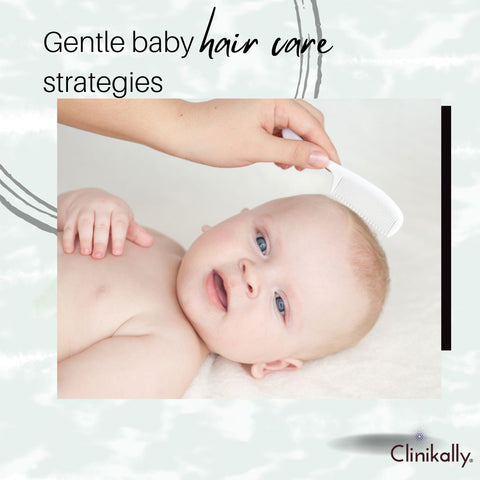
Gentle hair care is essential for your baby's sensitive scalp and hair. Here are some strategies for maintaining a gentle and nurturing hair care routine:
-
Choose a gentle, tear-free baby shampoo designed specifically for infants. Look for hypoallergenic products that are free of harmful chemicals, fragrances, and dyes.
-
Babies typically do not require frequent hair washing. Aim to wash your baby's hair 2-3 times per week to avoid stripping away natural oils and drying out the scalp.
-
Before you shampoo your baby's hair, wet it with lukewarm water. Avoid using hot water because it can be too harsh on the scalp and hair follicles.
-
Apply a small amount of baby shampoo to your baby's scalp with your fingertips. Avoid harsh scrubbing, which can irritate the scalp.
-
After shampooing, thoroughly rinse your baby's hair with warm water to get rid of any soap residue. Pour water over their head using a gentle cup or your hand, being careful not to make direct contact with their eyes.
-
After bathing, gently pat your baby's hair with a soft towel to remove excess water. Avoid rubbing or wringing their hair, as this can cause breakage and tangles.
-
Use a wide-tooth comb or a soft brush designed for babies to gently detangle your baby's hair. Start from the ends and work your way up to the roots, being careful not to pull or tug on the hair.
-
Whenever possible, allow your baby's hair to air dry naturally after bathing. Avoid using heat styling tools such as hair dryers or curling irons, as they can damage your baby's delicate hair.
-
Consider using gentle hair accessories such as soft headbands, scrunchies, or clips to keep your baby's hair out of their face while protecting their sensitive scalp.
-
As your baby's hair grows, trim any wispy ends or split ends to keep their hair healthy and prevent tangles.
-
Keep an eye out for symptoms of scalp irritation or conditions like cradle cap. If you notice redness, flakiness, or unusual patches on your baby's scalp, consult your paediatrician for advice.
By incorporating these gentle hair care strategies into your baby's routine, you can help keep their scalp and hair healthy, clean, and comfortable while avoiding unnecessary irritation or discomfort.
Importance of baby nail care for overall health
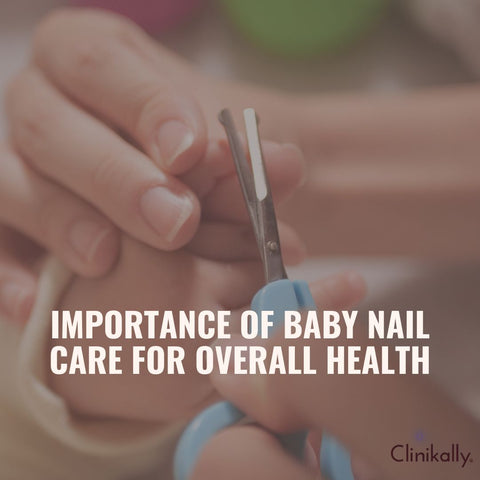
Baby nail care is an important aspect of overall health and well-being for the following reasons:
-
Babies' nails grow quickly and can be sharp, increasing the risk of accidental scratches to their delicate skin, especially on the face and body. Trimming their nails on a regular basis can help reduce the risk of skin injuries.
-
Babies may inadvertently scratch themselves, causing skin breaks that could become infected. Keeping their nails short and clean reduces the chance that harmful bacteria will enter these tiny wounds, lowering the risk of infection.
-
Long nails can cause discomfort in babies, especially if they accidentally scratch themselves or others. Trimming their nails helps them stay comfortable and irritation-free.
-
Babies frequently explore their surroundings with their hands, which raises the risk of nail-related injuries like snagging or tearing. Regular nail care helps to avoid such injuries and promotes safe exploration.
-
Keeping your baby's nails clean helps them develop good hygiene habits from a young age. Clean nails are less likely to contain dirt, bacteria, or other debris that can cause infections.
-
Babies may inadvertently scratch themselves while sleeping, which can disrupt their sleep patterns and cause discomfort. Short, well-groomed nails reduce the risk of sleep disturbances caused by scratching.
-
Long nails increase the risk of accidental eye injuries when babies rub their eyes with their hands. Trimming nails on a regular basis reduces this risk and protects their sensitive eyes.
-
Teaching your baby proper nail care at a young age promotes independence and self-care skills as they get older. It also instills good grooming habits that will help them throughout their lives.
Remedies for baby heat rash and skin soothing
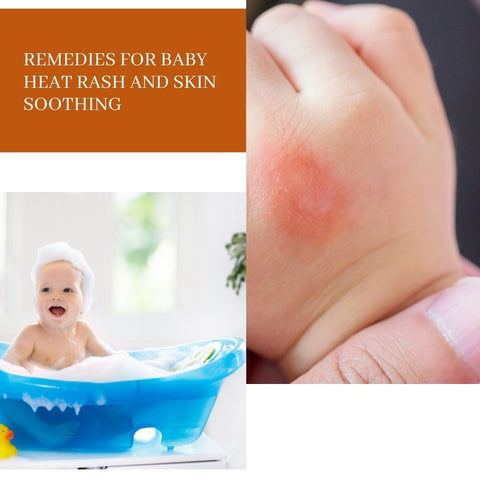
Heat rash, also known as prickly heat or miliaria, develops when sweat ducts become clogged and sweat becomes trapped beneath the skin, causing redness, irritation, and tiny bumps. Here are some remedies and skin-soothing techniques to help relieve baby heat rash.
-
Keep the Skin Cool and Dry: Dress your baby in lightweight, breathable clothing made from natural fibers like cotton. Avoid overdressing your baby, especially in hot and humid weather. Use air conditioning or fans to maintain a comfortable temperature indoors. Keep your baby's sleeping area cool and well-ventilated.
-
Frequent Baths: Give your baby lukewarm baths to help cool the skin and remove sweat and irritants. Avoid using harsh soaps or scrubbing the affected area, as this can further irritate the skin. Pat your baby's skin dry gently with a soft towel after bathing. Avoid rubbing, as this can exacerbate irritation.
-
Keep the Skin Moisturized: Apply a gentle, fragrance-free moisturizer to your baby's skin to help soothe irritation and keep it hydrated. Look for moisturizers containing ingredients like aloe vera or oatmeal, which have soothing properties.
-
Avoid Irritating Products: Avoid using products that may further irritate your baby's skin, such as scented lotions, perfumes, or harsh detergents. Choose mild, hypoallergenic skincare products specifically formulated for babies with sensitive skin.
-
Oatmeal Baths: Adding colloidal oatmeal to your baby's bathwater can help soothe irritated skin and reduce inflammation. Use a muslin bag or clean sock to contain the oatmeal and prevent it from making a mess in the bath.
-
Cool compresses: Place cool, damp washcloths or gauze pads on the affected areas to reduce inflammation and relieve itching and discomfort. Ice packs and very cold compresses should be avoided because they are too harsh on your baby's sensitive skin.
-
Keep Your Baby Hydrated: Give your baby plenty of breast milk or formula to help him stay hydrated, especially in hot weather. If your baby is older and eating solid foods, provide water in between meals to avoid dehydration.
-
Consult a Paediatrician: If your baby's heat rash persists or worsens despite home remedies, or if you notice signs of infection, such as pus or increased redness, see your paediatrician for further evaluation and treatment.
By using these remedies and skin-soothing techniques, you can help your baby's heat rash and relieve discomfort and irritation.
Enhancing Baby's Well-being: Environmental and Seasonal Care
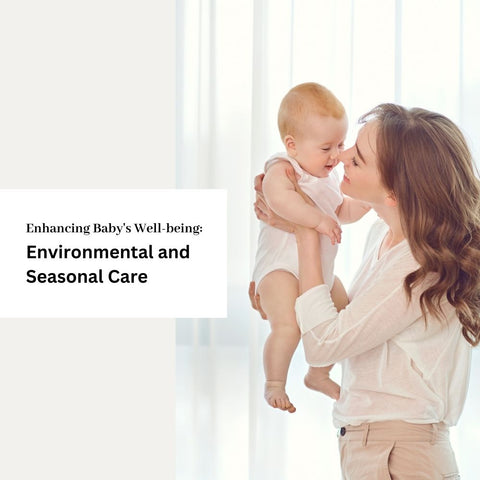
Enhancing your baby's well-being through environmental and seasonal care entails providing a nurturing and safe environment that meets their physical, emotional, and developmental needs. Here are a few suggestions for each aspect:
Environmental Care:
-
Make sure your baby's cot meets safety standards, including a firm mattress, a fitted sheet and no soft bedding or toys that could cause suffocation. To reduce the risk of Sudden Infant Death Syndrome (SIDS), follow the safe sleep guidelines.
-
Keep your baby's living spaces well-ventilated and free from indoor pollutants. Avoid smoking indoors and use an air purifier if needed to improve air quality.
-
Babyproof your home by securing furniture, covering electrical outlets, and removing small objects that could be choking hazards. Install safety gates, cabinet locks, and window guards to prevent accidents.
-
Choose non-toxic, eco-friendly cleaning products and avoid using harsh chemicals or pesticides in your home. Opt for organic or natural materials whenever possible for bedding, clothing, and toys.
-
Create a sensory-rich environment for your baby by introducing toys, books, music, and colorful objects that stimulate their senses and encourage exploration.
Seasonal Care:
-
Dress your baby in layers to regulate their body temperature according to the weather. Use lightweight, breathable fabrics in summer and add extra layers in winter to keep them warm and comfortable.
-
Protect your baby's delicate skin from the sun's harmful UV rays by dressing them in lightweight clothing that covers their arms, legs, and head. Use a broad-spectrum sunscreen with SPF 30 or higher on exposed skin, and seek shade during peak sun hours.
-
Ensure your baby stays well-hydrated during hot weather by offering breast milk, formula, or water frequently. Avoid over-bundling your baby in warm weather to prevent overheating.
-
Reduce your baby's exposure to common allergens like pollen, dust, and pet dander, particularly during allergy season. Close the windows, use air purifiers, and bathe your baby frequently to remove allergens from their skin and hair.
-
Be aware of temperature changes indoors and outdoors, and dress your baby accordingly to keep them comfortable. Use fans, air conditioners, or heaters as needed to keep your home at a comfortable temperature.
-
Take advantage of the nice weather by spending time outside with your baby. Go for walks in the park, play in the backyard, or engage in other outdoor activities that promote physical activity and sensory exploration.
By focusing on environmental and seasonal care, you can create a nurturing and supportive environment that promotes your baby's overall well-being and healthy development. Pay attention to your baby's cues and adjust their care routine as needed to keep them comfortable and safe all year.
Protecting baby skin in cold weather
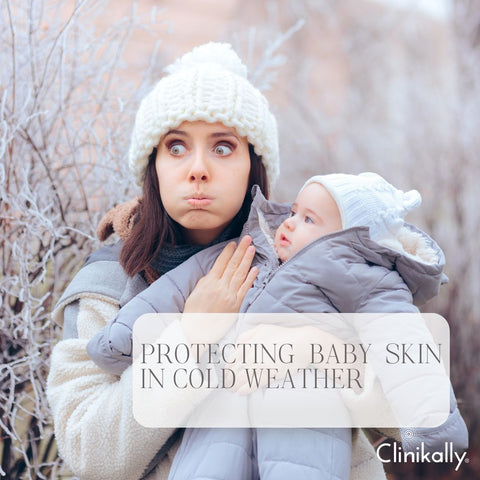
Protecting your baby's skin from cold weather is critical to avoiding dryness, irritation, and discomfort. Here are some ways to keep your baby's skin healthy and moisturised during the colder months:
-
Dress your baby in multiple thin layers rather than a single thick layer. This allows you to adjust their clothing as needed to keep their body temperature comfortable both indoors and out.
-
Choose soft, natural fabrics like cotton and wool to keep your baby warm without irritating their skin. Avoid synthetic materials that can trap moisture, resulting in overheating or chafing.
-
Dress your baby in hats, mittens, and booties to protect his or her skin from cold temperatures and wind. Ensure that these accessories fit snugly but not too tightly to allow for proper circulation.
-
Indoor heating can dry out the air, causing dry skin. Use a humidifier in your baby's room to moisten the air and keep their skin from becoming dry and irritated.
-
While bathing is necessary to keep your baby clean, keep it to 5-10 minutes and use lukewarm water rather than hot. Avoid using harsh soaps or bubble baths, as these can deplete the skin's natural oils and cause dryness.
-
Apply a gentle, fragrance-free moisturiser to your baby's skin after bathing and throughout the day to help seal in moisture and prevent dryness. Pay special attention to areas prone to dryness, such as your face, hands, and feet.
-
While it is important to keep your baby warm in cold weather, avoid overheating, which can cause sweating and skin irritation. Dress your baby in breathable layers, and remove excess clothing if they become too warm.
-
Even in cold weather, the sun's UV rays can damage your baby's skin. When spending time outside, protect any exposed skin with a broad-spectrum sunscreen with an SPF of 30 or higher.
-
Keep your baby hydrated by giving him breast milk, formula, or water on a regular basis, especially in heated indoor environments with dry air.
-
If your baby's skin becomes excessively dry, irritated, or develops a rash despite your best efforts to protect it, see a paediatrician for further evaluation and treatment options.
By following these guidelines, you can help protect your baby's skin from the harsh effects of cold weather and keep it healthy, hydrated, and comfortable throughout the winter season.
Eco-friendly baby skincare solutions
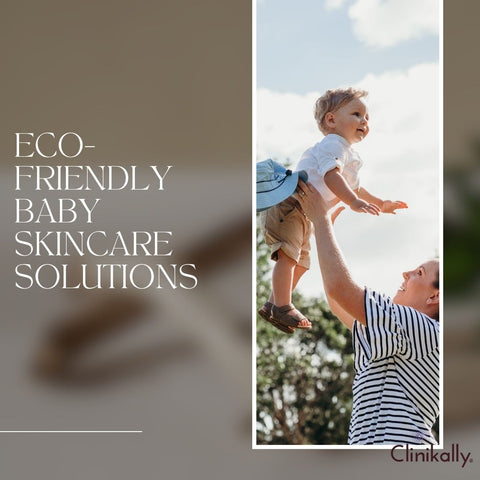
Using eco-friendly baby skincare solutions benefits both your baby's delicate skin and the environment. Here are some environmentally friendly options to consider:
-
Look for baby skincare products that contain organic and natural ingredients. These products are free of harsh chemicals, synthetic fragrances, and artificial dyes, making them safer for your baby's skin and the environment.
-
To reduce waste and environmental impact, choose baby skincare products that are packaged in biodegradable or recyclable materials. Look for brands that value sustainable packaging practices.
-
Choose skincare products with minimalist formulas that use fewer ingredients and avoid unnecessary additives. This reduces the environmental impact of production and disposal while lowering the risk of skin irritation.
-
Consider creating your own baby skincare products with simple, natural ingredients from your kitchen, such as coconut oil, shea butter, olive oil, and beeswax. DIY skincare gives you control over the ingredients and reduces packaging waste.
-
Instead of disposable wipes, opt for reusable washcloths made of organic cotton or bamboo. Washcloths are gentle on your baby's skin and can be washed and reused, which reduces waste and saves money over time.
-
Support eco-friendly and sustainable baby skincare companies that prioritise ethical sourcing, environmentally friendly manufacturing processes, and clear labelling.
-
Limit the amount of water used when bathing your baby. Fill the bathtub only with the amount of water needed, and consider using a water-saving showerhead or bath bucket.
-
Choose multi-functional baby skincare products, such as a gentle cleanser that can also be used as shampoo or a moisturising balm that works as a nappy rash cream. This reduces the number of products you need to purchase and helps to reduce waste.
-
Empty baby skincare containers should be disposed of responsibly and recycled whenever possible. Consider upcycling containers for other uses, such as storage or organisation, to help them last longer and reduce landfill waste.
By incorporating these eco-friendly baby skincare solutions into your daily routine, you can prioritise your baby's health while also reducing your environmental impact. Making conscious decisions about what products you use and how you dispose of them can benefit both your baby's future and the health of the planet.
Baby skincare routines for different climates
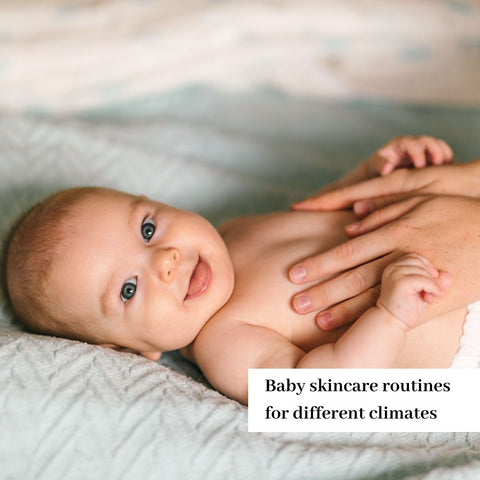
Adapting your baby's skincare routine to different climates is critical for keeping their skin healthy and comfortable. Here are some tips for adjusting your skincare routine based on the weather:
Hot and Humid Climates:
-
Bathe your baby more often in hot and humid weather to remove sweat, dirt, and irritants from their skin. To avoid drying their skin, use lukewarm water and a mild, fragrance-free baby cleanser.
-
Dress your baby in lightweight, breathable clothing made of natural fibres such as cotton to help wick moisture and keep them cool. Overdressing can lead to overheating and excessive sweating.
-
Protect your baby's skin from the sun's harmful UV rays by dressing them in lightweight, long-sleeved clothing and a wide-brimmed hat. Apply broad-spectrum sunscreen with an SPF of 30 or higher to all exposed skin, and seek shade during peak sunlight hours.
-
Keep your baby hydrated by giving him or her breast milk, formula, or water on a regular basis, especially during hot weather. To avoid dehydration, drink water or breast milk instead of sugary drinks.
-
To keep your indoor temperature comfortable and avoid overheating, use fans or air conditioning. Consider using a cool mist humidifier to moisten the air and prevent dry skin.
Cold and Dry Climates:
-
Bathe your baby less frequently in cold and dry climates to avoid stripping their skin of natural oils. Use lukewarm water and a gentle, moisturising baby cleanser, and keep the bath time to 5-10 minutes.
-
Apply a rich, emollient moisturiser to your baby's skin after bathing and throughout the day to help retain moisture and prevent dryness. Pay special attention to areas prone to dryness, such as your face, hands, and feet.
-
Dress your baby in layers for warmth and insulation in cold weather. Use soft, breathable fabrics like cotton and wool, and layer up as needed to keep them comfortable indoors and out.
-
Protect your baby's skin from cold winds and low temperatures by covering them with hats, mittens, and booties. Make sure these accessories fit snugly, but not too tightly, to allow for proper circulation.
-
Use a humidifier in your baby's room to moisten the air and keep their skin from becoming dry and irritated. Cleaning the humidifier on a regular basis will help to prevent mould and bacteria growth.
By tailoring your baby's skincare routine to the weather, you can help keep their skin healthy, comfortable, and well-protected in any setting. Pay attention to your baby's cues and check their skin for signs of irritation or dryness; if you have any concerns, consult a paediatrician.
































